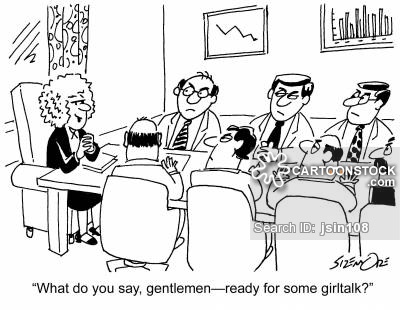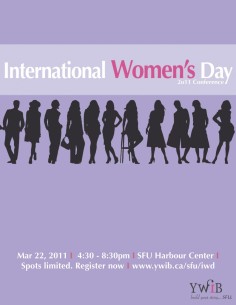Lately it’s become evident that while men and women consciously believe themselves to be equal, there’s a cognitive dissonance between one’s conscious beliefs and one’s subconscious actions in our society. The unequal treatment is obvious to women, but to most men it isn’t, and it needs to be called out despite whatever intentions were present. Who’s better to call out misogyny than the very people who have to experience it every day?

Misogyny is described as the dislike of, contempt for, or the ingrained prejudice against women. In most cultures throughout history, women have been seen as the lesser sex as compared to men, who usually had more rights of self than women did. As women were seen as less or below their male counterparts, they were often subjected to belittling and/or patronizing behavior that usually cornered them into stereotypes. Even women themselves were conditioned to believe these stereotypes and became perpetrators in harassing their own gender.
Of course, over the years this behavior has become less and less the norm, and both men and women have come to see themselves as equal to each other in mostly every way. However, as misogyny has been a part of our culture and our very lives for a long time, the “less-ness” of women has been ingrained into too many mindsets and though we may believe we’re equal, many still subconsciously believe otherwise, and it’s going to take constant calling-out to change that.
Many women have taken up that mantle over the years. It formally began with the suffrage movement and evolved as it continued on to present-day, with feminists of all genders pointing out the blatant misogynistic acts committed by people who often don’t realize what they’re doing. Those who do know what they’re doing are all the more subjected to a more fiery and passionate response from the feminist masses. Many institutions in our culture appropriate this ingrained misogyny and help continue this ridiculous mindset despite efforts to curtail this problem, and its only with the continued fight against them by feminists that help spread the awareness about how awful that mindset is.
It’s simply a matter of respect, at this point. Women and men are inherently created equal, and as such women should be afforded the same respect as men in all aspects of life, including but not limited to the workplace, their body standards, and more. To not receive the same kind of respect men save for men is both insulting and empowering – insulting in that we, as women, aren’t seen as equal to men, and empowering in that women are coming together to band against this ingrained misogyny.
The media is a great place for people to voice their opinions and call out people for theirs. It’s also a great place to identify misogyny at work and slam people for those views. Many female writers are coming out of the woodworks to be a voice in the mass media to criticize the misogyny still present in our society, targeting any problematic behavior they find in our culture and in our government. These women also support and promote female empowerment in their articles to fight against the idea that women would never amount to much of anything (a bold-faced lie misogynists want you to believe).
However, a lot of these women don’t get the credit they should for doing what they do. I myself hadn’t heard of some of these women before, which is insane because all of these journalists are outspoken about these issues and haven’t been getting any notoriety for it.
Promoting female empowerment in an otherwise male-centric medium is difficult work, but journalist Jia Tolentino seems to be doing just fine. Tolentino is a contributing staff writer for the New Yorker and was previously an editor for Jezebel. Many of her articles focus on American culture and trends, however she does have a few that pertain to politics and more heavy-hitting topics like the recent Bill O’Reilly sexual harassment scandal that ended with the well-known anchor fired from Fox.
One of her articles published New Yorker articles, “The Infantilizing Ways We Talk About Women’s Ambition”, is both a supportive and critical piece of the way female ambition is handled in our culture today. Often, when a woman’s ambition is discussed, there’s feminine elements attributed to age-old beliefs of fema le success tied in with said ambition. Tolentino brings up a few examples of this by using recent model spreads to discuss the hypocrisy behind the “ambitious woman”, one in particular an Equinox campaign that depicted a “model in a restaurant, wearing expensive formalwear and breastfeeding twins”. Tolentino also describes the Tory Burch Foundation as having a cause that felt “beside the point” as Burch’s “Embrace Ambition” campaign was self-described as “apolitical and that Burch pointed out she had “a lot of Republican friends”, which did nothing to further the campaign itself other than try to make it a flimsy device for gender unity.
le success tied in with said ambition. Tolentino brings up a few examples of this by using recent model spreads to discuss the hypocrisy behind the “ambitious woman”, one in particular an Equinox campaign that depicted a “model in a restaurant, wearing expensive formalwear and breastfeeding twins”. Tolentino also describes the Tory Burch Foundation as having a cause that felt “beside the point” as Burch’s “Embrace Ambition” campaign was self-described as “apolitical and that Burch pointed out she had “a lot of Republican friends”, which did nothing to further the campaign itself other than try to make it a flimsy device for gender unity.
The point being made here in Tolentino’s argument is that the ambitious woman shouldn’t have to be a mother or appeal to a controversial political party in order to be classified as “ambitious”. Many men are single or childless and are still considered ambitious, yet when a woman is in the workplace, she’s often not considered positively unless she is hard-working with children and/or a husband. Apparently that’s the only way women can be believed to be ambitious because surely all women want to have children or be married while they’re focusing on their career. Please note the sarcasm in that last sentence.
See my point, though? Women should be able to be ambitious without having either of those things, just like men. That’s what Tolentino’s advocating for in her article. She’s also arguing that Burch’s comments about wanting to remain “apolitical” and “having a lot of Republican friends” goes against the very campaign Burch made because it’s assuming that Republicans don’t want gender equality and that any Republican woman isn’t ambitious because of it. The “apolitical” comment also makes it seem like Burch is appealing to the Republican party to keep away controversy, when controversy is exactly what’s necessary to make a movement in gender equality. It also puts the campaign on shaky ground without a clear standing point.
Another article of Tolentino’s, “Mike Pence’s Marriage and the Beliefs that Keep Women from Power”, calls out the ridiculous notion that women are inherently sexual objects who cannot be trusted alone with a married man. Tolentino takes a logical approach to the controversy but still calls out the sheer audacity of such an ingrained mindset, as often people who advocate for it take the stance that the man is simply being loyal to his wife. She points out the number one question of the people against Vice President Pence’s stance by asking, “How could you rule out meals with a person of the opposite gender over the course of an entire career?” Tolentino goes on to say that it “speaks [of] an incredible level of inequity in the workplace” as “no successful woman could ever abide by the same rule”.

It’s true, though. In order to be successful, women have to go to greater lengths and endure this kind of ridiculousness in order to be considered half as important as a man in an equal position. A woman has to be alone with a man, with men, because that’s part of her job and if she isn’t alone with one, she can’t do her job correctly. And yet, men can be alone with men and still be afforded the same courtesy as women who work as hard as they do without ever having to be alone with a woman. Why is that?
Journalist Emma Gray also has the same questions. Emma Gray is the Executive Women’s Editor at the Huffington Post and many of her articles focus on sensitive women’s topics and misogyny in the workplace. Recently, her articles have gained publicity due to her fiery responses to the 2016 presidential election and the rampant sexism present in the now two most powerful men in American government. Like Tolentino, Gray also had an opinion on Vice President Pence’s stance on being alone with a woman.
In her article “Why It Matters that Mike Pence won’t have Dinner with a Woman Who isn’t His Wife”, Gray argues that his stance is reminiscent of an older time where evangelical pastor Billy Graham, in the Modesto Manifesto, called for “each man…to never be alone with a woman other than his wife… Graham…pledged not to eat, travel or meet with another woman other than [his wife] unless other people were present”. Though it’s testament to Vice President Pence’s dedication to his wife, his actions are also disrespectful to women who are trying to be the best they can be at their chosen profession. According to Gray, it’s also disrespectful that “any interaction not under the watchful eye of a spouse would inevitably lead to infidelity. In this worldview, men have no self-control, and women are either temptresses or guardians of virtue.”
Essentially, that worldview promotes the thought that women only want to succeed in their careers by utilizing every advantage they have to get them there, including their bodies. It demeans women to sexual objects. Is that right? No!
Journalist Lindy West connects women depicted as sexual objects to general body image in her article “I’m not going to answer the same question about being fat anymore.” Posted on the Guardian, the article discusses how fat-shaming has become a prominent issue in society and that society’s body standards for the average woman makes fat-shaming all the more difficult. West explains in her article that on a YouTube video she posted of her eating a cookie, a large portion of the comments on her video are men calling her fat and telling her to commit suicide because “she [was a] disgusting pig”. Many of the comments comment on her looks and how unappealing she is. West is awed that her “cookie video has become a vessel into which a certain contingent of angry, lonely men can pour all of their fury at women who fail or refuse to please them sexually.” Because men aren’t used to seeing healthy, fat women in media, they take out their frustrations by not seeing the society driven “thin must mean beautiful” woman and shame West (and other women like her) into hating who they are.

Being female shouldn’t dictate the kinds of opportunities available to women in the workplace, and it definitely shouldn’t be dictated by the kinds of expectations our patriarchal society has deemed women should act or be like. These kinds of acts may not be as explicitly prominent anymore, but they are still present deep in our subconscious and the only way to get rid of them is to address the issue head on.
The ingrained misogyny present in our society needs to be called out, and these three women are only a few of the many journalists who call it out for what it is, when it happens. In order for women to be both consciously and subconsciously seen as equal to their male counterparts, these instances of misogyny need to be dealt with and made public so society can become more aware of how wrong it is.
These three journalists are just a few of a much larger movement that has set out to call out internalized misogyny and provide different perspectives as to why misogyny is so problematic. If these women were able to reach a larger audience over a multitude of platforms, then this movement would be able to spread more rapidly and expand the knowledge that gender equality is necessary for a more united society.
